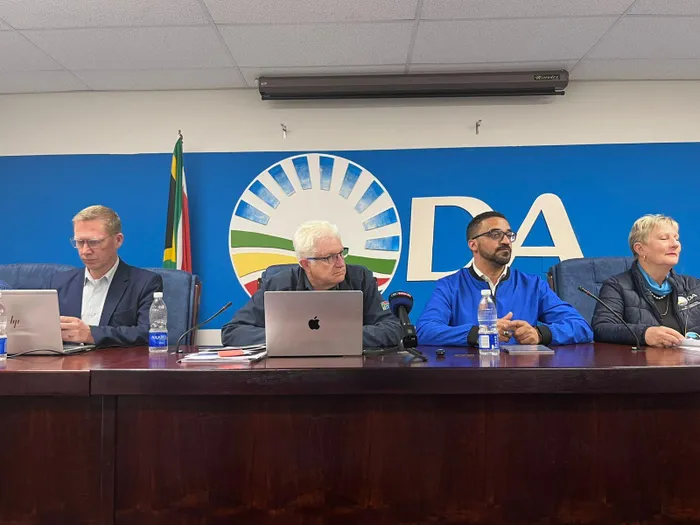SAPS and DA highlight urgent need for action as violent crime surges in Western Cape

The Democratic Alliance held a media briefing about the gun violence in the province and the devolution of powers.
Image: Mandilakhe Tshwete
The Western Cape is facing a sharp surge in violent crime, police and provincial officials warned on Friday, as gang shootings, taxi violence, and stretched policing resources threaten communities across the province.
The Democratic Alliance (DA) held a media briefing to highlight the challenges, while the South African Police Service (SAPS) Provincial Commissioner, Lieutenant-General Thembisile Patekile, briefed the Provincial Parliament’s Standing Committee on Police Oversight and Community Safety.
DA Western Cape leader Tertuis Simmers said municipalities are constrained by national legislation, which limits their ability to combat crime.
“Our people deserve to live in safety, free from fear and free from the grip of crime. But for far too long, the national government has actually failed to provide adequate tools… Empowering capable municipalities to actually make our streets safer can be done with a single stroke of the acting National Minister’s pen,” he said.
Simmers presented a memorandum to Acting Police Minister Firoz Cachalia and Justice Minister Mmamoloko Kubayi, calling for legislative amendments to give capable municipalities investigative powers.
The document cites a 22% drop in active SAPS officers in the province, from 16,224 to 12,908, and notes the backlog of detectives managing over 200 dockets each, well above the international norm of 50 to 60. It also highlights more than 4,000 trained municipal enforcement staff ready to support SAPS.
“The Western Cape Government and many of its municipalities have been fighting for safer communities, innovating where we govern, supporting SAPS within the legislative framework. However, local government and its enforcement officers are constrained by national legislation. This is a brake on justice,” the memorandum states.
Premier Alan Winde said gangs, extortion, and taxi conflicts are putting residents at risk.
“Our policing capabilities are being diminished every single day. In 2019, we had around 20,000 active policemen and women on our streets. Today, active police officers on our streets are just under 13,000,” Winde said.
He also cited 902 detective vacancies in the province, warning that arrests without thorough investigations undermine justice.
Mayco member for Safety and Security, JP Smith, said municipal law enforcement is often the first responder, but cannot investigate crimes under current legislation.
“We can patrol, we can arrest, we can seize evidence… but we cannot go on and investigate to find the evidence and to secure that conviction,” Smith said, adding that adding two words, “and investigate”, to the SAPS Act could transform policing in municipalities.
Police Oversight and Community Safety MEC Anroux Marais said the provincial government is working within its mandate to strengthen cooperation between the SAPS, municipal law enforcement, and communities.
She highlighted the Mitchells Plain Safety and Development Plan as a citizen-centred approach. “The people of Mitchells Plain offered deep insight into the lived realities of crime in their area… Once completed, we aim to replicate this model in other communities facing similar challenges,” she said.
SAPS officials told the parliamentary committee that gang shootings and taxi violence are intensifying, driven by parolees returning to the streets and disputes over territory.
Clashes between rival associations CATA and CODETA have worsened tensions in Somerset West, Mfuleni, Hermanus, and Khayelitsha.
Police have concentrated resources in 13 high-priority precincts, including Delft, Manenberg, Mitchells Plain, Atlantis, and Bishop Lavis.
Operations Shanela II and Lockdown 3 include intelligence-led crackdowns, parolee monitoring, roadblocks, and community awareness campaigns. SAPS also collaborates with Correctional Services to trace absconders and monitor parolees.
Despite these interventions, police admitted that resource shortages, rapid gang retaliation, and complex taxi conflicts continue to undermine efforts.
Officials stressed that sustained inter-agency collaboration and enhanced investigative powers are crucial to protecting communities.
mandilakhe.tshwete@inl.co.za
Related Topics: